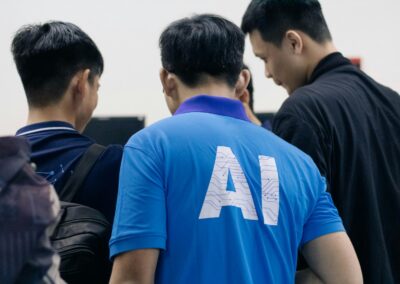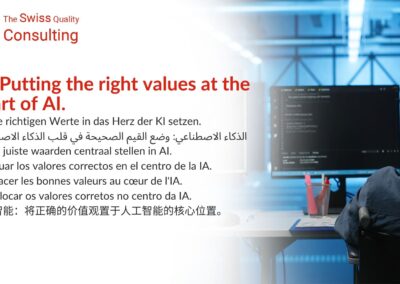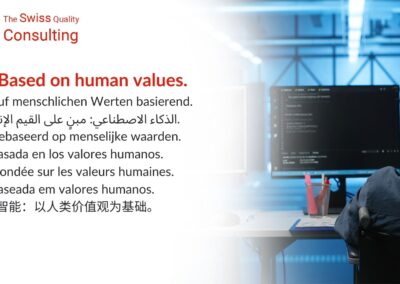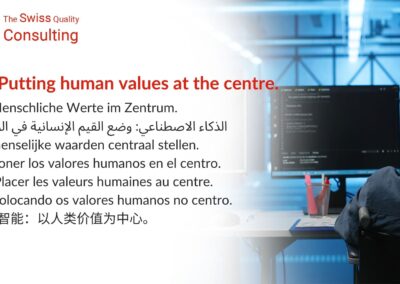Developing Ethical Frameworks for Superintelligent AI
The Imperative of AI Alignment with Human Values
Ensuring AI alignment with human values is a critical challenge that researchers and technologists must address as we advance toward the development of superintelligent AI. This involves creating frameworks that guarantee AI systems act in ways that are beneficial and in harmony with human goals. As artificial intelligence becomes increasingly sophisticated, the potential for AI to impact society grows exponentially, making it essential to ensure that these systems are designed with ethical considerations at their core.
In regions such as Saudi Arabia, the UAE, Riyadh, and Dubai, where technological innovation is rapidly progressing, the need for robust AI alignment frameworks is particularly pressing. Business executives, mid-level managers, and entrepreneurs must understand the importance of integrating ethical AI principles into their operations. This ensures that technological advancements contribute positively to society and align with cultural values and business objectives.
The alignment problem involves several complex issues, including the establishment of moral and ethical guidelines that superintelligent AI systems must follow. This requires collaboration between technologists, ethicists, and policymakers to create comprehensive and enforceable standards.
Frameworks for Ethical AI Development
Researchers are developing various frameworks to ensure that AI systems align with human values and goals. One approach is value alignment, which involves programming AI systems to recognize and prioritize human ethical principles. This method requires a deep understanding of human values and the ability to translate these values into computational instructions that AI can follow.
Another framework focuses on transparency and accountability in AI development. By making AI systems’ decision-making processes transparent, stakeholders can better understand how these systems operate and ensure they adhere to ethical standards. Accountability mechanisms, such as regulatory oversight and ethical review boards, can help monitor AI development and deployment, ensuring compliance with established ethical guidelines.
In the context of Dubai and Riyadh, where smart city initiatives and AI-driven projects are prominent, these frameworks can play a crucial role in maintaining public trust and ensuring that AI technologies are used responsibly. Businesses can leverage these frameworks to develop AI solutions that are not only innovative but also ethically sound, fostering a positive relationship between technology and society.
The Role of Executive Coaching and Leadership
Executive coaching and leadership development are vital components in the effort to align AI with human values. Leaders in the technology sector must be equipped with the knowledge and skills to navigate the ethical challenges posed by superintelligent AI. This includes understanding the implications of AI alignment and making informed decisions that prioritize ethical considerations.
In Saudi Arabia and the UAE, where leadership and innovation are highly valued, executive coaching programs can help leaders develop a comprehensive understanding of AI ethics. These programs can provide insights into the latest developments in AI alignment and offer practical strategies for implementing ethical AI practices within their organizations.
Moreover, fostering a culture of ethical leadership can have a ripple effect throughout an organization. When leaders prioritize ethical AI alignment, it sets a precedent for employees and encourages the adoption of responsible AI practices at all levels. This holistic approach can ensure that businesses remain at the forefront of technological innovation while upholding the highest ethical standards.
Challenges and Solutions in AI Alignment
Addressing the Complexity of Human Values
One of the significant challenges in AI alignment is the inherent complexity of human values. Human values are diverse, context-dependent, and often subjective, making it difficult to create a one-size-fits-all approach to AI ethics. Researchers must account for this complexity by developing flexible and adaptable AI systems that can navigate the nuances of human values.
Collaborative efforts between technologists, social scientists, and ethicists are essential to address this challenge. By integrating insights from various disciplines, researchers can develop AI systems that better understand and reflect the diversity of human values. In the UAE and Saudi Arabia, where multiculturalism and diversity are integral to society, this interdisciplinary approach can ensure that AI systems respect and uphold the values of all community members.
Furthermore, involving stakeholders from different sectors in the development process can provide valuable perspectives and help create more inclusive and representative AI systems. This collaborative approach can lead to AI technologies that are not only aligned with human values but also widely accepted and trusted by the public.
Implementing Robust Testing and Validation
Ensuring AI alignment with human values also requires rigorous testing and validation processes. AI systems must be thoroughly evaluated to ensure they behave as intended and adhere to ethical standards. This involves developing comprehensive testing protocols that assess AI performance across various scenarios and identify potential ethical issues.
Incorporating feedback loops into the testing process can help improve AI systems over time. By continuously monitoring AI behavior and collecting feedback from users, developers can identify areas for improvement and make necessary adjustments. This iterative approach ensures that AI systems remain aligned with human values as they evolve and adapt to new challenges.
For businesses in Riyadh and Dubai, implementing robust testing and validation processes is crucial for maintaining the integrity and reliability of AI systems. By investing in thorough testing and validation, organizations can mitigate risks and ensure that their AI solutions are safe, ethical, and effective.
Promoting Ethical AI Practices Globally
The alignment of superintelligent AI with human values is a global challenge that requires international cooperation and coordination. Establishing global standards for AI ethics and alignment can help ensure that AI technologies are developed and deployed responsibly worldwide. International organizations and regulatory bodies can play a key role in promoting ethical AI practices and fostering collaboration between countries.
For business executives and leaders in the UAE and Saudi Arabia, participating in international forums and initiatives focused on AI ethics can provide valuable insights and opportunities for collaboration. By engaging with the global AI community, organizations can stay informed about the latest developments in AI alignment and contribute to the creation of ethical standards that benefit society as a whole.
In conclusion, ensuring AI alignment with human values is a critical task that requires concerted efforts from researchers, technologists, business leaders, and policymakers. By developing robust frameworks, fostering ethical leadership, and promoting international cooperation, we can create a future where superintelligent AI systems enhance human well-being and contribute positively to society. As regions like Saudi Arabia, the UAE, Riyadh, and Dubai continue to lead in technological innovation, their commitment to ethical AI practices will set a global example and pave the way for a brighter, more inclusive future.
—
#AIAlignment #SuperintelligentAI #HumanValues #AIEthics #ArtificialIntelligence #SaudiArabia #UAE #Riyadh #Dubai #Blockchain #TheMetaverse #ExecutiveCoaching #GenerativeAI #BusinessSuccess #LeadershipSkills #ProjectManagement























